Maccoll Surname Ancestry ResultsOur indexes 1000-1999 include entries for the spelling 'maccoll'. In the period you have requested, we have the following 48 records (displaying 11 to 20): Single Surname Subscription | | | Buying all 48 results of this search individually would cost £226.00. But you can have free access to all 48 records for a year, to view, to save and print, for £100. Save £126.00. More... |
These sample scans are from the original record. You will get scans of the full pages or articles where the surname you searched for has been found. Your web browser may prevent the sample windows from opening; in this case please change your browser settings to allow pop-up windows from this site. Boys entering Clifton College
(1885)
Clifton College near Bristol was established in 1862. This edition of the Clifton College Annals and Register for the Old Cliftonian Society by F. Borwick was published in 1925. Boys are listed alphabetically by term of entry, with full names, surname first, in bold. Father's (or widowed mother's) name is given (surname and initials) in capitals, and address. Then there is the name of the house (N. T., North Town; S. H., School House; S. T., South Town), first and last forms, distinctions in school work and games, and month of leaving. Where known, the editor then gave a career summary with month of death; or, if still living, address as in 1925 (in italics).MACCOLL. Cost: £4.00.  | Sample scan, click to enlarge
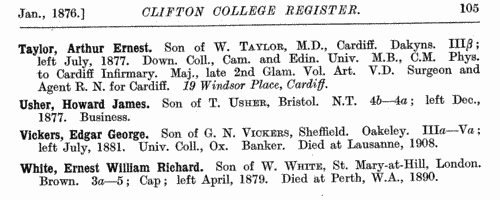
| Men-at-the-Bar
(1885)
Joseph Foster's Hand-List of Men-at-the-Bar gives a paragraph biography of men who had been called to the bar and were alive in 1885. After the full name (surname first, in capitals) there is a short statement of occupation or practice; a student at which inn of court; when called to the bar; father's name and then address; when born; if married, and, if so, wife's name (and her father's name) is often given. At the foot, in small type, is present residence, as of 1885.MACCOLL. Cost: £4.00.  | Sample scan, click to enlarge
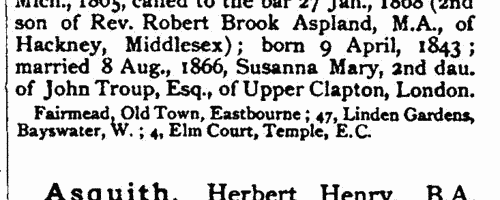
| Boys entering Trinity College, Glenalmond
(1888)
Trinity College, Glenalmond, Perthshire, was originally founded as a college at which young men might be trained for the ministry of the Scottish Episcopal Church, and the sons of the laity might be educated and brought up in the faith and tradition of the Church. In 1876 the Theological College was transferred to Edinburgh, Glenalmond remaining as a boys' school. This second edition of the school register, edited by G. St Quintin, was published in 1955, incorporating the text of the first edition prepared by E. W. Neish. The scholars are listed by term of entering the school, and then alphabetically by surname; the details then given are full christian names, date of birth; name of father; any distinctions within the school; and then a career synopsis, with date and place of death where known. MACCOLL. Cost: £6.00.  | Sample scan, click to enlarge
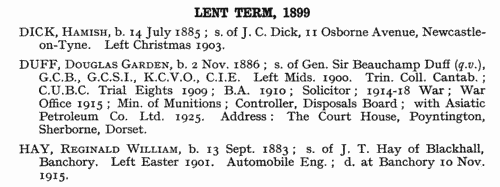
| Speakers at the Anglican Church Congress
(1892)
The 32nd annual congress of the Anglican church was held at Folkestone on the 4th, 5th, 6th and 7th October 1892. Moral and social questions were discussed as well as the purely theological and ecclesiastical - The Relation between the Authority of the Bible and the Authority of the Church; the Attitude of the Church towards Labour Combinations; the Work of the Church of England on the Continent; the Result of the Neglect of Religious Instruction in Elementary Schools; Canon Law; the Duty of the Church to the Agricultural Population; Christian Ethics; Meeting of Women; the Temperance Movement; Physical Recreation; the Permanent Value of the Old Testament; Thrift and the Poor Law; Vivisection; Preparation for Clerical Orders, and of Laymen for Evangelism; Foreign Missions; the Duty of the Church towards Soldiers; Christian Doctrine and Christian Life; Preaching in the Church of England; and the Church's Work at the Seaside. The sermons, letters, addresses and discussions (of clergy and laity) were all published in this, the official report of the congress. MACCOLL. Cost: £6.00.  | Sample scan, click to enlarge
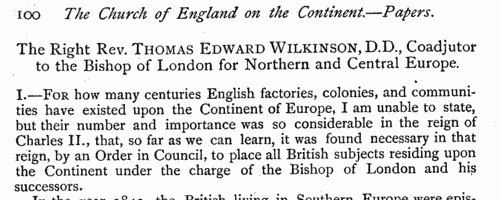
| Boys at University College School
(1860-1900)
In 1830 a school was set up adjoining the University and College of London on Gower Street; the school was enlarged from 1860 to 1876, and then removed to Frognal in 1907. In 1931 this register was published, listing all boys entering the school from Christmas term of 1859 to the summer entrants of 1931. The dates are abbreviated (98-01 = 1898-1901, &c.), each session being reckoned as beginning in September of one year and ending in the July of the next; the date of joining the school is indicated by the former, although it may fall in the latter, but the date of leaving by the latter, although it may fall in the former. Thus, if a boy came at any time during the Session 1863-64 and left any time during 1868-69, his date would be given 1863-69. The boys are listed alphabetically by surname, and then chronologically under each surname, full name being given where known. An asterisk * indicates that that particular boy lost his life in the Great War: in these cases, rank and regiment have been given where possible. Addresses as of 1931 are given where known. Italics in christian names or initials indicate that that particular boy was known, in 1931, to be dead. (a) (b) &c placed before christian names indicates brothers. In some cases occupation in later life is shown (A, artist; B, barrister; C A, chartered accountant; Ch, chemist; E, engineer; H C S, home civil service; I C S, Indian civil service; Med, physician or surgeon; M S E, member of the Stock Exchange; Mus, musician; Rev, minister of religion; S, solicitor). This is the index to those boys who were at the school in the period 1860 to 1900.MACCOLL. Cost: £4.00.  | Sample scan, click to enlarge

| Member of the North-East Coast Institution of Engineers and Shipbuilders
(1903)
This membership list, as of July 1903, is divided into four grades - Honorary Members, Members, Associates and Graduates. In each case the full name (or name and initials) is given with personal or business address, and month of election to that grade, and to the lower grades. The list is annotated with these abbreviations: A., Agent and Accountant; B. B., Boiler Builder; C. E., Civil and Consulting Engineer; E., Engineer and Boilermaker; E. A., Engineering Agent; E. E., Electrical Engineer; F., Iron and Brass Founder; F. M., Forge Master; I. & S. M., Iron and Steel Merchant or Manufacturer; M., Merchant; M. S., Marine Superintendent; N. A., Naval Architect; R. M., Rope Manufacturer; S., Shipbuilder; S. O., Ship Owner; SUR., Engineer & Ship Surveyor.MACCOLL. Cost: £4.00.  | Sample scan, click to enlarge
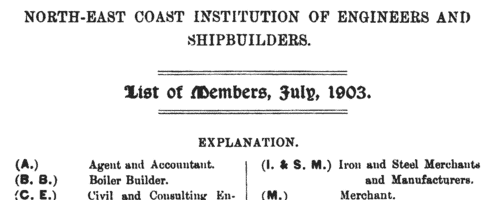
| Boys entering Clifton College
(1907)
Clifton College near Bristol was established in 1862. This edition of the Clifton College Annals and Register for the Old Cliftonian Society by F. Borwick was published in 1925. Boys are listed alphabetically by term of entry, with full names, surname first, in bold. Father's (or widowed mother's) name is given (surname and initials) in capitals, and address. Then there is the name of the house (N. T., North Town; S. H., School House; S. T., South Town), first and last forms, distinctions in school work and games, and month of leaving. Where known, the editor then gave a career summary with month of death; or, if still living, address as in 1925 (in italics).MACCOLL. Cost: £4.00.  | Sample scan, click to enlarge
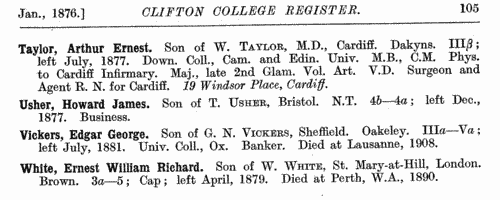
| Civil Servants and Office Holders
(1907)
The Imperial Calendar gives lists of officials and office-holders throughout England, Wales, Scotland and Ireland
MACCOLL. Cost: £4.00.  | Sample scan, click to enlarge
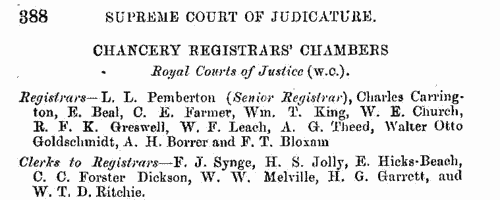
| Boys entering Sherborne School
(1909)
The grammar school at Sherborne in Dorset, which doubtless existed from the creation of the diocese of Sherborne in 705, was refounded by king Edward VI in 1550. At the quatercentenary in 1950, a fourth edition of the Sherborne Register was published, listing boys entering the school during those four centuries. In truth, the materials for this register survive but fitfully before 1823; for some years, no names are known; sometimes all that is known is a surname. But from 1823 onwards the lists and the details get steadily more comprehensive. By the 20th century the boys are listed alphabetically by surname under term of entrance. Surname is given in bold, then christian names, name of father (surname and initials) and address; year of birth; house (a, School House; b, Abbey House; c, The Green; d, Harper House (formerly The Retreat); f, Abbeylands; g, Lyon House; h, Westcott House); whether represented the school at cricket (xi), football (xv), shooting (viii), &c.; year of leaving; summary of degrees, career &c.; and (in italics), address as of 1950. Names in the early lists marked with an asterisk are found inscribed on the oak panelling or on the stone walls of the former schoolroom. (F) in the lists indicates a foundationer, receiving free education: after 1827, when this privilege was restricted to boys from Sherborne and neighbourhood, nearly all foundationers were day-boys.MACCOLL. Cost: £4.00.  | Sample scan, click to enlarge
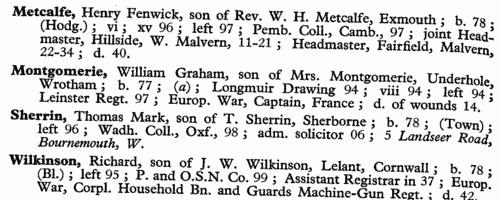
| Civil Servants and Office Holders
(1910)
The Imperial Calendar gives lists of officials and office-holders throughout England, Wales, Scotland and Ireland
MACCOLL. Cost: £4.00.  | Sample scan, click to enlarge
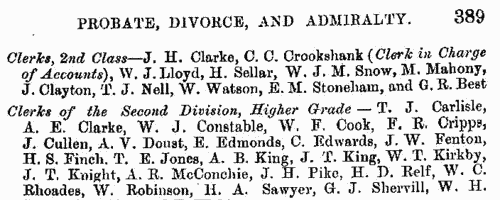
|
Research your ancestry, family history, genealogy and one-name study by direct access to original records and archives indexed by surname.
|












